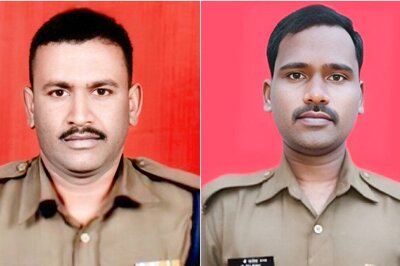
views
Kottayam: The Suryanelli girl goes to the office in the morning with her long, wavy hair neatly combed, tiny gold earrings glinting, packed lunch in hand, like a normal working woman in India. But once she leaves her front gate, she holds her body tight, with shoulders hunched and arms wrapped around her, and looks down.
If she makes eye contact, a stranger at the bus stop might recognize her and point her out as the former 16-year-old who was raped by more than 40 men over more than 40 days. Worse still, if she dares to raise her face, she may spot the men themselves.
For all but one of her attackers walked free, while it is the Suryanelli girl who might as well be in prison. For 17 years now, her life has been put on hold, frozen at the night of January 16, 1996. There has been no justice, no closure that would allow her to move on and salvage the pieces of who she used to be.
It would have been easier if she had quietly disappeared, as do most of the tens of thousands of survivors of rape in India every year. Instead, her fight for an elusive justice has marked her, she says sadly, as a "shameless woman."
And her punishment is to be victimized, again and again, by the police, the courts, the local officials and the society in which she lives. Since law does not permit the naming of rape victims or their families during trial, her moniker comes from the beautiful hillside village in the southern state of Kerala that was once her home.
Yet it has been eight years since she lived in Suryanelli. Her family was hounded out because taxis and buses full of tourists were stopping outside their house.
As she talks about the rapes, she anxiously twirls the edge of her traditional powder blue dupatta scarf. Her smile is childlike and eager to please, her soft, whispery voice still that of a shy 16-year-old.
"I did nothing wrong, but I'm the only one still suffering," she says. "My side of the story was not heard by anyone." All across India - in Suryanelli, in New Delhi, in Mumbai and Kolkata -- there are nameless, faceless girls who have been raped.
The government recorded 24,206 rapes in 2011. With a population of almost 1.2 billion, India's official number of rapes per capita does not stand out. However, the vast majority of attacks go unreported because of police apathy and cultural stigma.
"From decades of working in villages and slums, I can say that when 10 sexual crimes happen, only one gets reported," says Ranjana Kumari, director of Delhi's Center for Social Research. Rape is often viewed less as a crime against a woman than as her shame. Most of the time, the victims hide, on their own accord or forced by their families, and life goes on.
Sexual harassment is part of a landscape of fear that almost all women in India must negotiate. Women learn from girlhood to dress conservatively - legs covered, nothing tight or revealing -- on buses and trains. They avoid going out after dark. They teach themselves to ignore the lewd comments that are rampant in the streets, market places and most other crowded public spaces.
The general silence on sexual violence gave way in December after a particularly vicious gang rape in a relatively posh part of the capital, New Delhi. Tens of thousands of people mourned the death of a young university student so brutally attacked with a metal bar that doctors later found pieces of her intestines floating inside her.
With the sudden spotlight on rape, the case of the Suryanelli girl was pulled out of cold storage, where it had languished for eight years. India's Supreme Court ordered a retrial to be completed in six months. Now she is waiting, as she has for the past 17 years, for a justice that may never come.
The Suryanelli girl grew up as a shy, often sickly child who clung to her parents. She spent most of her life with her older sister inside the sheltered confines of Catholic boarding schools, as her father, a postmaster, and her mother, a nurse, moved between assignments.
When her sister graduated in 1994, she moved back home with her parents. Then she relocated in a new boarding school closer to their home amid the gentle hills and tea gardens of Suryanelli, so she could take the bus home to her parents every weekend.
It was on the bus rides that she met Raju, the ticket collector. She was 16. He was a decade older. He was always hard up for cash, and told her he had to support his mother and two sisters. She felt bad for him and wanted to help.
Like so many teenagers, she fell in love. And like so many good Indian girls, she hid her love from her religious, Catholic family. She gave him whatever small sums of money she could. She tried to pawn some of her gold jewelry. Once she even gave him money her father had given her for school fees.
She loved Raju, but she was also afraid of him. He got hold of an album of family photographs she had lent a school friend, and then demanded she run away with him. If she went, he vowed to marry her. If she didn't, he threatened to morph the photos atop images of naked bodies and plaster them all over her school.
She was nervous and unsure, but she agreed to go. In preparation, she hid some cash and three of her mother's saris, two made from traditional heavy silk and another of a lightweight voile. She thought she might need one for the wedding.
On January 16, 1996, she met him at the local bus stand. He bought them two tickets. As is often the case on buses in rural Kerala, he sat at the back with the other men.
When she got off at the place Raju had picked, he was not there. It was too late to go back to school. In her panic, she caught another bus headed toward her aunt's house in a town nearby.
She reached her destination close to midnight, and a strange woman seemed to be following her. The woman knew her name, and introduced her male companion as someone who knew her relatives. The man offered to take her to their house. Instead he took her to a nearby guesthouse and raped her.
The next 42 days passed in a blur of beatings and rapes by a parade of strange men. She was taken to homes and hotels, in cars and public buses, driven more than 2,000 miles across two states. She was forced to drink arrack, a local liquor made from fermented coconut flowers, and sedated with pills.
Her attackers included a retired professor, lawyers, businessmen and government officials. When she resisted, the first man who raped her threatened to kill her parents. "I'm a lawyer," he told her, "I will never get caught for this." One man seemed older than the others, and she begged him for pity. "You are old enough to be my papa. Please rescue me from here." He raped her too.
When she thought she would die, they gave her a little money and left her at a bus station. She thought her ordeal had ended. But it was only the beginning.
When the men set her free, she took a bus straight to her father's post office. There she waited outside in silence. Her father is frail and stooped, with bags under his eyes and the look of a man who has been very tired for a very long time. The memory of seeing his daughter that day is burned into his brain - her bloated body, her face covered in scratch marks. "I cannot describe it," he says. "And I cannot forget it. When she left, she was a young girl in a school uniform. When she came back, she looked like a grown woman, her body puffy and swollen....I knew immediately what she had gone through."
They went to the local police, who tried to dissuade her from reporting the crime. It took two days to file the first report. The police took the girl and her father everywhere she had been forced to go, in a police van, like culprits -- with several of the suspects. Every day was a humiliation. The police and the perpetrators seemed like friends, laughing and joking together.
She was examined by a male gynecologist. Victims of rape in India generally have to undergo the so-called "two-finger test." Doctors probe the vagina to see if it is lax, the term commonly used, and if a hymen is absent. Both are taken as evidence the woman routinely has sex and so must have consented to intercourse.
In the case of the Suryanelli girl, the doctor did not perform the two-finger test. He said her vagina was simply too damaged. It took three years for the case just to reach a court in India's overburdened justice system. And when it did, it was not the men who were on trial - it was the character of the girl.
Lawyers for the accused cross-examined her relentlessly for days, in minute detail that seemed designed to embarrass her. "How many pairs of underwear did you have?" "'Did your underwear get torn when you were raped?" "Did they undo the string on your pants or did they cut it?" "Did the pants get torn?" "Did you carry any sanitary napkins during your travels?"
The men said either that they had never even met her or that the sex was consensual. Some had minor links to a political party and claimed they were part of a political vendetta.
But at least the trial court offered the girl a chance at justice. The judge, who was liberal by Indian standards, believed that a woman's failure to resist could not be seen as consent. He found all 35 accused guilty and sentenced them to between 4 and 14 years in prison, for charges ranging from conspiracy and kidnapping to gang rape and trafficking. For one moment, it looked like the Suryanelli girl had won.
It was a short-lived victory. None of the men served any time in jail. They all filed appeals in the state high court and walked free on bail. Nine years later, the case finally came before the Kerala High Court.
There the two judges spoke with sarcasm about her ability to befriend strangers easily, noted by the bus driver. They brought up her childhood bedwetting, saying the fact that her sister had washed the sheets showed "a tendency to make others responsible" for her problems.
Most of all, they found, she was not a "normal innocent" 16-year-old. She had shown the nerve to pawn jewelry and give money to a secret boyfriend, risky behavior that betrayed shaky character. And why hadn't she tried to escape when she was kept in guesthouses and transported in public buses?
Her word couldn't be trusted. In fact, everything she said was to be doubted. The "million dollar question," the judges said, was not whether more than three dozen men had had sex with her over 42 days. It was whether she had been a willing partner, now turning on them to protect her reputation. The verdict was clear.
"She needed money. She was prepared to raise it. She had needs which her parents did not know," the judgment said. "She is thus shown to be a girl of deviant character." The judges acquitted 35 of the 36 accused. The men were found guilty only "of the immorality of going to a woman, who they thought was a prostitute."
SS Dharmarajan, the lawyer and the first man to rape her, was eventually sentenced to five years in prison. But he had already absconded, and never served any time. He was finally arrested two months ago and is in jail pending an appeal. The life of the Suryanelli girl, now a woman of 33, has fallen apart.
After her ordeal, friends vanished. Relatives slunk away. People said her father was selling his daughter and bought his house from the money she made. Every day is an exercise in facing fear. The only place she goes is to her job as a clerk in a local sales tax office.
Sometimes she slips into an empty church to seek comfort in prayer. The years of isolation
The family lives in Kottayam, about 100 miles from the sprawling bungalow that was once their home in Suryanelli. Her sister, a nurse, works and stays at a hospital where nobody knows her background. Her mother quietly mourns the lost happiness of both her daughters. "Who will marry them?" she asks. "Who will look after them when we're gone?"
Faith was the cornerstone of the family, back in what they think of as the time before everything happened. Even today, images of the Virgin Mary and Jesus decorate the living room, and several rosaries hang from a nail hammered into the wall. But in March, they lost the solace of church too. Their local priest gently suggested they stay away for a while because people had begun to recognize them.
The woman still known as the Suryanelli girl reads her bible every night. The Psalm of David soothes her: "Contend, O Lord, with those who contend with me; fight against those who fight against me." If she is finally proven right and the offenders are sent to jail, she says she will have some peace. But even then there are things lost to her forever.
"I will never have a normal life," she says. "Marriage, children, that is just not possible for a girl like me ... sometimes I feel angry. But mostly, I just feel very, very sad." She has been thinking of that other woman, the one who died after being gangraped in New Delhi. She is almost envious. "God blessed her by taking away her life," she muses. "She does not have to suffer what I have suffered for these 17 years."


















Comments
0 comment